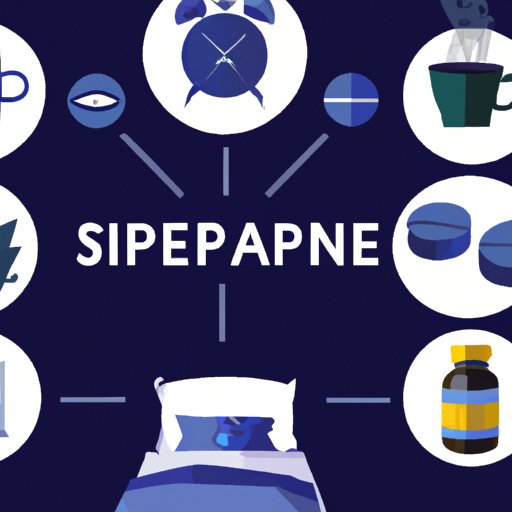Introduction
If you’ve ever had trouble falling asleep or staying asleep, then you know how frustrating and debilitating insomnia can be. According to the National Sleep Foundation, insomnia is “a sleep disorder characterized by difficulty falling asleep, staying asleep, or both.” Unfortunately, it’s estimated that up to 30% of adults suffer from insomnia at some point in their lives. While there are medications and supplements available to help treat insomnia, there are also lifestyle changes you can make to improve your sleep.
In this article, we’ll cover eight tips for improving your sleep if you’re having trouble sleeping. We’ll discuss how to create a sleep-friendly environment, the importance of exercise during the day, avoiding stimulants late in the day, reducing stress with relaxation techniques, going to bed at the same time every night, taking an afternoon nap, and talking to your doctor about medications or supplements.
Create a Sleep-Friendly Environment
The first step to getting better sleep is to create a sleep-friendly environment. According to a study published in the journal Applied Ergonomics, “environmental factors have a significant role on human performance and health.” Your bedroom should be dark, quiet, and comfortable. The temperature should be cool, between 60 and 67 degrees Fahrenheit.
You should also keep electronics out of the bedroom. This includes televisions, computers, tablets, and phones. The blue light produced by these devices can disrupt your sleep cycle. If you need white noise to block out other noises, try using a fan, air purifier, or noise machine.
Exercise During the Day
Exercise is important for overall health, and it can also help you get better sleep. According to a study published in the journal Sports Medicine, regular physical activity can help improve sleep quality. Aim for at least 30 minutes of moderate-intensity exercise most days of the week.
It’s also important to note that too much exercise can actually have a negative effect on your sleep. A study published in the journal Sleep Medicine Reviews found that excessive exercise can lead to insomnia. So if you find that your exercise routine is affecting your sleep, you may want to scale back a bit.

Avoid Caffeine and Other Stimulants Late in the Day
Caffeine is a stimulant, so it’s best to avoid it late in the day. According to a study published in the journal Sleep Medicine, “caffeine has been shown to reduce total sleep time, delay sleep onset, reduce sleep efficiency, and increase nighttime awakenings.” Try to limit your caffeine intake to earlier in the day and switch to decaffeinated beverages after lunch.
Other stimulants, such as nicotine and energy drinks, can also affect your sleep. If you’re having trouble sleeping, it’s best to avoid these as well. Herbal teas, such as chamomile or lavender, can be a good alternative to caffeinated beverages.

Reduce Stress with Relaxation Techniques
Stress can be a major cause of insomnia, so it’s important to find ways to reduce stress and relax before bed. According to a study published in the journal Sleep Medicine Reviews, “relaxation techniques have been proven to be effective in improving sleep quality.” Examples of relaxation techniques include deep breathing, progressive muscle relaxation, visualization, and yoga.
Meditation can also be a helpful tool for reducing stress and improving sleep. A study published in the journal JAMA Internal Medicine found that mindfulness meditation improved sleep quality, increased sleep duration, and reduced symptoms of insomnia.
Try to Go to Bed at the Same Time Every Night
Having a consistent bedtime can help you get better sleep. According to a study published in the journal Sleep Medicine, “sleep regularity is associated with better sleep quality.” Try to go to bed at the same time every night and wake up at the same time every morning.
If you find yourself struggling to stick to a regular bedtime, try setting an alarm to remind yourself when it’s time to go to bed. You can also keep a sleep journal to track your sleep patterns and identify any potential issues.
Take an Afternoon Nap
Napping can be a great way to catch up on lost sleep, but it’s important to do it the right way. According to a study published in the journal Sleep Medicine Reviews, “short naps (less than 30 minutes) can improve alertness and cognitive performance without interfering with nighttime sleep.” Aim for naps of 20-30 minutes in the afternoon.
It’s also important to note that napping too late in the day can interfere with your nighttime sleep. If you find that napping is making it harder for you to fall asleep at night, try to limit your naps to earlier in the day.

Talk to Your Doctor About Medications or Supplements
If lifestyle changes aren’t enough to improve your sleep, talk to your doctor about medications or supplements. There are several medications available to treat insomnia, including benzodiazepines, nonbenzodiazepines, and melatonin receptor agonists. Your doctor can help you decide which one is right for you.
There are also herbal supplements available that can help improve sleep. Valerian, chamomile, and lavender are all thought to have calming effects that can help with insomnia. Talk to your doctor before taking any supplements to make sure they’re safe for you.
Conclusion
Insomnia can be a frustrating and debilitating condition. Fortunately, there are lifestyle changes you can make to improve your sleep. To recap, here are eight tips for better sleep: create a sleep-friendly environment, exercise during the day, avoid stimulants late in the day, reduce stress with relaxation techniques, go to bed at the same time every night, take an afternoon nap, and talk to your doctor about medications or supplements.
By following these tips, you should be able to get better sleep and start feeling more rested and energized.
(Note: Is this article not meeting your expectations? Do you have knowledge or insights to share? Unlock new opportunities and expand your reach by joining our authors team. Click Registration to join us and share your expertise with our readers.)
